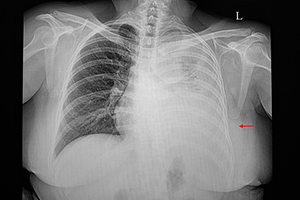Patients with non–small cell lung cancer (NSCLC) who have pleural effusion, especially those requiring pleural evacuation, experienced poorer survival when treated with immune checkpoint inhibitors, according to findings presented by Epaillard et al at the European Society for Medical Oncology (ESMO) Immuno-Oncology Virtual Congress 2020 (Abstract 42P).
Researchers explained that the pleura is a common site of metastatic involvement in patients with NSCLC, and the pleura also acts as a natural barrier that can limit the penetration and efficacy of immune checkpoint inhibitors. These factors led to the PLUIE study assessment of the clinical outcome of patients with NSCLC who have pleural effusion and were treated with an immune checkpoint inhibitor.
PLUIE Details
This multicenter, international, retrospective study identified 538 patients with NSCLC who were treated with an immune checkpoint inhibitor from November 2012 to November 2019. The investigators stratified this cohort by pleural effusion (n = 196) vs no pleural effusion (n = 342) as of the immunotherapy baseline.

Photo credit: Getty
Overall survival and the early death rate served as the primary endpoints, and the secondary outcomes were progression-free survival and disease control rate. The association between outcomes and pleural effusion was evaluated using logistic regression, whereas univariate and multivariate Cox models were performed for overall and progression-free survival.
The median patient age in the overall population was 62.9 years; 34.6% of patients were female; 9.5% were never smokers; and 75.7% of patients had nonsquamous NSCLC. The characteristics were similar in the pleural effusion group: the patients’ median age was 64.4 years; 31.6% were female; 12.4% were never smokers, and 77.6% had nonsquamous NSCLC. Immune checkpoint inhibitors were administered as first- or second-line therapy in 66% of patients, and 94% of patients received immune checkpoint inhibitor monotherapy.
In terms of patient characteristics, an association was found between pleural effusion and a higher number of metastatic sites: the pleural effusion cohort had a median of 3.5 metastatic sites compared with a median of 2.7 metastatic sites in the no–pleural effusion cohort. Pleural effusion was also associated with a poorer Eastern Cooperative Oncology Group performance status: 90.8% of patients with pleural effusion vs 80.5% of those without pleural effusion had a performance status of at least 2.
Key Findings
Regarding the primary objective, the overall cohort demonstrated a median overall survival of 9.7 months (95% confidence interval [CI] = 8.1–11.8 months), whereas the pleural effusion cohort had a median overall survival of 6.3 months (95% CI = 4.0–8.6 months) compared with 11.4 months (95% CI = 9.7–13.8 months) in the no–pleural effusion cohort (P = .002). The early death rate was 31.4% in the overall cohort, whereas the early death rates in the pleural effusion compared with no–pleural effusion cohorts were 38.3% vs 27.5% (odds ratio [OR] = 1.63, 95% CI = 1.13–2.37, P = .01).
Progression-free survival was 1.8 months (95% CI = 1.7–2.5 months) in the pleural effusion cohort compared with 2.3 months (95% CI = 2.0–3.6 months) in the no–pleural effusion group (P = .04).
Following adjustment for performance status; liver, intracranial, or bone metastasis; the immunotherapy line; and the derived neutrophil-to-lymphocyte ratio, pleural effusion remained an independent prognostic factor for overall survival (hazard ratio [HR] = 1.38, 95% CI = 1.09–1.74, P = .007) and progression-free survival (HR = 1.35, 95% CI = 1.09–1.68, P = .006). The disease control rate was 49.9% in those with pleural effusion compared with 52.3% in those without pleural effusion (OR = 1.64, 95% CI = 1.14–2.40, P = .01).
Of the 196 patients in the pleural effusion cohort, 73 (37.2%) patients required pleural evacuation, which was associated with a significantly increased early death rate of 52% in patients who had it vs 30.5% in those who did not (P = .003).
The authors concluded that pleural effusion is associated with worse prognosis and lower responses to treatment with an immune checkpoint inhibitor.
Disclosure: For full disclosures of the study authors, visit oncologypro.esmo.org.

